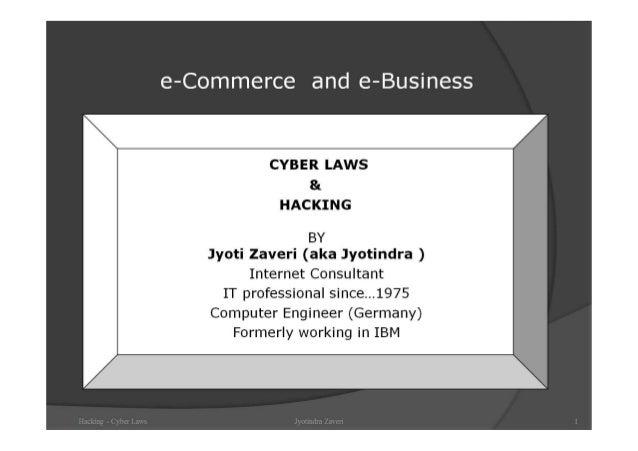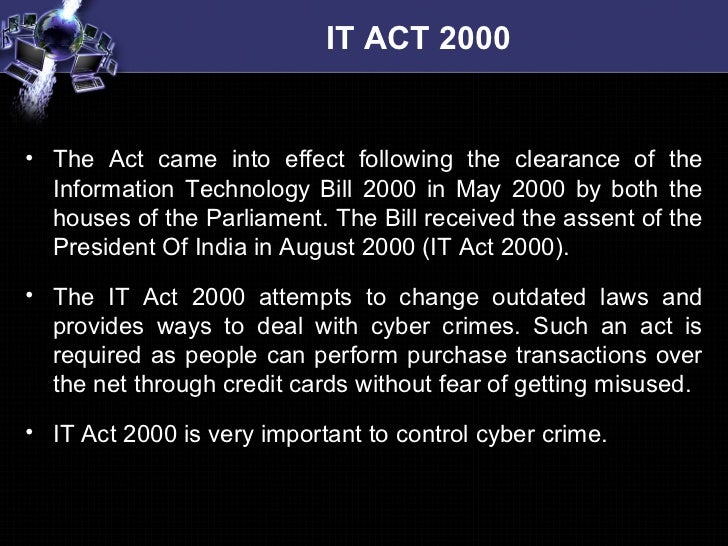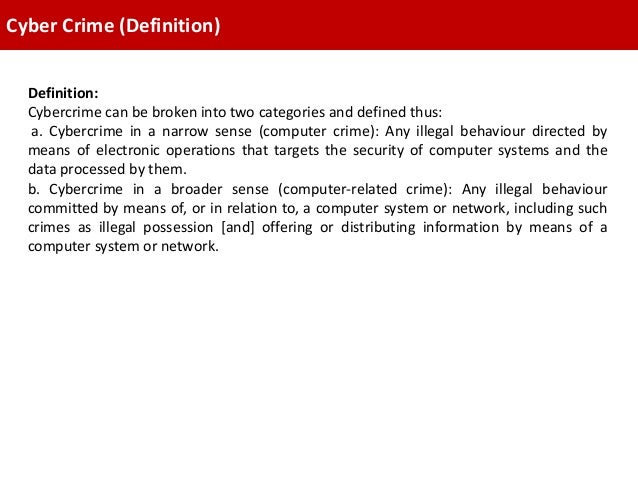Hacking Under Information Technology Act 2000

Information technology act, 2000. 66. hacking with computer system. –. (1) whoever with the intent of cause or knowing that is likely to cause wrongful loss or damage to the public or any person destroys or deletes or alters any information residing in a computer resource or diminishes its value or utility or affects it injuriously by any means, commits hacking. 1information technology act, 2000 —s. s. 1. short title, extent, commencement and application. —(1) this act may be called the information technology act, 2000. (2) it shall extend to the whole of india and, save as otherwise provided in this act, it applies also to any offence or contravention thereunder committed outside india by any person.
Offences & penalties under the information technology act, 2000. the introduction of the internet has brought the tremendous changes in our lives. people of all fields are increasingly using the computers to create, transmit and store information in the electronic form instead of the traditional papers, documents. Nov 16, 2011 · under section 66-c, there is provision of fine for identity theft, for dishonest use of password of any other person. i order that she pay a token fine of rupees one hundred to the state treasury. before sh. rajesh aggarwal, adjudicating officer, information technology act 2000, government of maharashtra, at mantralaya, mumbai — 400032. Cyber crimes have troubled internet users right since the introduction of cyberspace into our lives. over the years, governments around the world have also laid down many laws and regulations to help fight cyber crimes. in this article, we will look at the classification of cyber crimes and also the provisions in the information technology act, 2000 to deal with cybercrimes.
Offences And Punishment Under The Information Technology

Apart from the ones listed above, crimes like hacking, denial of service attacks, e-mail bombing, etc. are also present in cyberspace. provisions of cyber crimes in the it act, 2000. the sections of the it act, 2000 pertaining to cybercrimes are as follows: section 43 penalty for damage to a computer, computer system, etc. The offences included in the i. t. act 2000 are as follows − tampering with the computer source documents. hacking with computer system. publishing of information which is obscene in electronic form. power of controller to give directions. directions of controller to a subscriber to extend facilities to decrypt information. protected system. The increase rate of technology in computers has led to enactment of information technology act hacking under information technology act 2000 2000. the converting of the paper work into electronic records, the storage of the electronic data, has led tremendous changed the scenario of the country.
This is considered the first case convicted under section 67 of information technology act 2000 in india. in a recent case, a groom’s family received numerous emails containing defamatory information about the prospective bride. fortunately, they did not believe the emails and chose to take the matter to the police. The information technology act, 2000 is an act of the indian parliament notified on 17 october 2000. it is the primary law in india dealing with cybercrime and electronic commerce. information technology act, 2000 parliament of india long title the act to provide legal recognition for transactions carried out by means of electronic data interchange and other means of electronic communication, commonly referred to as "electronic commerce", which involve the use of alternatives to paper-based meth. Offences under it act, 2000. on december 19, 2014 march 22, 2019 by admin. the indian parliament passed the law information technology act, 2000. the it act 2000 has been conceptualized on the united nations commissions on international trade law (uncitral) model law hacking with the computer system:. Email hacking is punishable under information technology act, 2000. tg team. corporate law judiciary. 16 nov 2011. 14,729 views. 0 comment. respondent no. 1 has violated section 43 of it act, and made unauthorized access to g mail accounts of her husband and her father-in law, and unauthorisedly downloaded/forwarded/printed their emails and chat sessions with others, thus committing identity theft by using the password belonging to others dishonestly, and violating the privacy of not.
Laws Against Hacking In India Ipleaders
Essay on the offences and punishment under the information technology act, 2000! the various offences and the punishment provided for them are contained in chapters ix and xi of hacking under information technology act 2000 the act. these offences are briefly stated as follows:— 1. unauthorized access (section 43): the section lays down that any person who accesses or secures access to The first information report under sections 469 ipc and 66a information technology act, 2000 was registered based on the said complaint at the police station, economic offences wing, the elite wing of delhi police which specializes in investigating economic crimes including cyber offences. Information technology act, 2000. (21 of 2000) [9th june, 2000] an act to provide legal recognition for transactions carried out by means of electronic data interchange and other means of electronic communication, commonly referred to as “electronic commerce”, which involve the use of alternatives to paper-based methods of communication and storage of information, to facilitate electronic filing of documents with the government agencies and further to amend the indian penal code, the. All said and done, the information technology act,2000 is a great achievement and a remarkable step ahead in the right direction. the it act is a first step taken by the government of india towards promoting the growth of electronic commerce so that electronic commerce in india can leap frog to success.


Dec 19, 2014 · the accused paid fine amount and he was lodged at central prison, chennai. this is considered the first case convicted under section 67 of information technology act 2000 in india. in a recent case, a groom’s family received numerous emails containing defamatory information about the prospective bride. The parliament of india has passed its first cyberlaw, the information technology act, 2000 which provides the legal infrastructure for e-commerce in india. hacking under information technology act 2000 the said act has received the assent of the president of india and has become the law of the land in india.
It shall now be possible to try and punish hackers under section 66 of the it act,2000. the said act also provides for the constitution of the cyber regulations advisory committee which shall advice the government as regards any rules or for any other purpose connected with the said act. The following punishment is mentioned in which section of it act 2000 '3 years of imprisonment and/or 5 lakh repees penalty for first conviction & 5 years of imprisonment and/or 10 lakh rupees penalty. Under section 66-c, there is provision of fine for identity theft, for dishonest use of password of any other person. i order that she pay a token fine of rupees one hundred to the state treasury. before sh. rajesh aggarwal, adjudicating officer, information technology act 2000, government of maharashtra, at mantralaya, mumbai — 400032.
The information technology act, 2000 (also known as ita-2000, or the it act) is an act of the indian parliament (no 21 of 2000) notified on 17 october 2000. it is the primary law in india dealing with cybercrime and electronic commerce. The information and technology act, 2000 (it act) covers all types of cyber crime committed in the country including hacking under information technology act 2000 hacking. hacking earlier used to refer to a crime under section 43 of the it act but at the same time, ethical hacking or better known as white collar hacking was considered legal. History the information technology act, 2000 came into force on 17 october 2000. this act applies to whole of india, and its provisions also apply to any offense or contravention, committed even outside the territorial jurisdiction of republic of india, by any person irrespective of his nationality. Cyber law covers legal issues which are related to the use of communicative, transactional, and distributive aspects of network information technologies and devices. it encompasses the legal, statutory, and constitutional provisions which affect computers and networks. history the information technology act, 2000 came into force on 17 october 2000.
Komentar
Posting Komentar